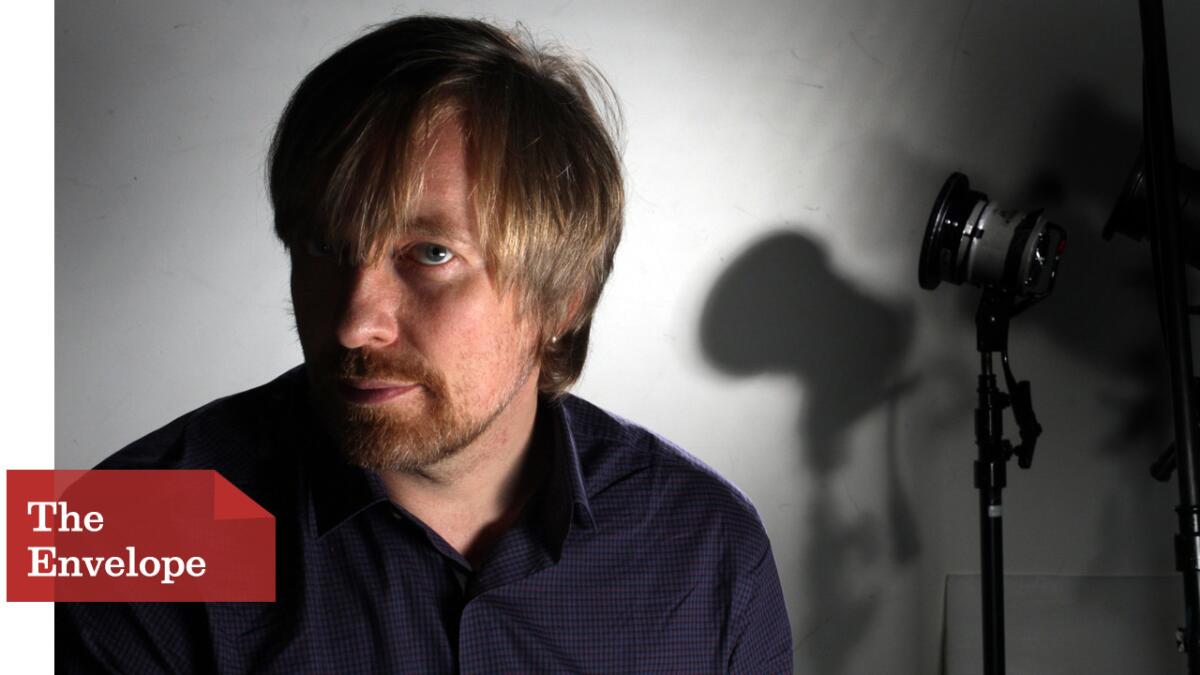The Envelope: ‘Imitation Game’ director Morten Tyldum on doing justice to Alan Turing

- Share via
Considering how the subject of “The Imitation Game,” British scientist Alan Turing, was the creator of the proto-computer, it’s only fitting that Norwegian director Morten Tyldum is using one of the most ubiquitous fruits of that revolution, a cellphone, to talk to the media about his lauded film: “If it sounds bad, it’s because I’m grocery shopping with my wife.”
Tyldum, best known in this country for his slick, smart art-and-murder thriller “Headhunters,” made his English-language debut with “The Imitation Game.” A crowd-pleaser that won the Audience Choice Award at this year’s Toronto International Film Festival, it’s the story of how Turing (Benedict Cumberbatch) invented, and built, electronic computing devices in the 1940s to crack the until-then unbreakable German Enigma code — a war-winning scientific advance on par with the work of the Manhattan Project to create the atomic bomb. Turing then fell into depression and apparently committed suicide after the war when exposed as a homosexual, which, at that time in Britain, was a crime.
Did you know this story before the script found you?
I thought I knew who Alan Turing was. I’ve always loved history, and I was actually shocked by how little I actually knew. I was amazed this wasn’t common knowledge. Why wasn’t he on the front covers of my history books? He’s one of the great thinkers of the last century, and he was sort of pushed into the shadows. The importance of making this movie and spreading the legacy of this man becomes so big.
A big part of the film is not just explaining Turing’s work to break Enigma, it’s also explaining how Enigma worked. How hard was it to convey that information to show the enormity of the challenge?
It’s an incredible challenge, not only explaining it but explaining it in a way that’s thrilling, that doesn’t get in the way of the human emotions or the rhythm of the movie. Trying to explain Turing’s work in encryption and decryption? It’s complicated. And we said, “There are some people who won’t get this, and we don’t care.” We wanted a movie for smart people.
On a lighter note, Benedict Cumberbatch is a superb actor, but were you ready for the fact that to a number of fans he’s like a very tall Beatle?
He is! He was a huge star in the U.K. when we cast him, but it shot up disproportionately while we were shooting. And Benedict’s a very sensitive man; I think he was in the process where he was dealing with all of it. I know that we’d have paparazzi outside, and he would have to act, and there were paparazzi taking pictures of him. I know that frustrated him. He loves his fans, and he’s very devoted to them ... but the press and the paparazzi? He’s an actor, through and through.
The film’s come under some fire for not explicitly and directly addressing Turing’s homosexuality while others are praising it for its boldness in showing it. Is that a balancing act that, in the end, might not make everybody happy?
I think you hit it on the head. He wasn’t first and foremost a gay man; he was first of all a brilliant man, who did amazing things, the forefather of the computer, the man who broke Enigma ... and he was prosecuted and wrongly crucified for being a gay man, and it was an important part of him. I think it’s almost to our credit to say that [we have a gay character without] the need to have a sex scene that has nothing to do with the narrative, plot and characters; plus, historically, Turing described his time at Bletchely (working on Enigma) as “a sexual desert.”
As the inventor of the computer, would Alan Turing be delighted we’ve all got them in our pockets now with cellphones, or would he be dismayed we’re using them for “Angry Birds” and “Candy Crush”?
Alan Turing loved games! He didn’t call [his scientific thought-experiment] “The Imitation Test”; he called it “The Imitation Game.” He loved games, he loved puzzles; he created his own board games. He was playful in many ways. I think he’d be a little surprised — he said in 60 years we’d be unable to tell a machine from a human being, and that hasn’t happened ... yet.
More to Read
From the Oscars to the Emmys.
Get the Envelope newsletter for exclusive awards season coverage, behind-the-scenes stories from the Envelope podcast and columnist Glenn Whipp’s must-read analysis.
You may occasionally receive promotional content from the Los Angeles Times.










